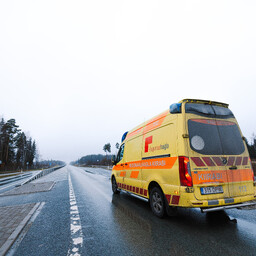Eesti helistajad on väga koostööaltid. Isegi kui nad tekitavad probleeme, on nad pigem liiga agarad ja lahendus on neil kõne ajal silme ees. Samuti tekib Eesti hädaabikõnedes harva olukordi, kus helistaja tõlgendab
päästekorraldaja
küsimust rünnakuna või vestluspartnerid ütlevad teineteisele halvasti.
päästekorraldaja
Tõlge fraasile: päästekorraldaja
EN
emergency dispatcher
Kuna
hädaabikõnesid
tehakse sageli ohtlikus ja pingelises olukorras, võib suhtlusprobleeme ikkagi ette tulla. Iga arusaamatuse tõttu pikale veninud kõne aeglustab abi saabumist. Piret Upser uuris oma doktoritöös, millised
suhtlusprobleemid
ja miks Eesti hädaabikõnedes tekivad. Ta uuris 100 kõnet ja analüüsis 50 kõne põhjal eri tüüpi suhtlusprobleeme.
hädaabikõnesid
Tõlge fraasile: hädaabikõnesid
EN
emergency calls
suhtlusprobleemid
Tõlge fraasile: suhtlusprobleemid
EN
communication problems
Eesti inimesed helistavad numbrile 112 kahel põhjusel: nad soovivad abi või infot. Mõnikord muutub abikõne infokõneks, kui
päästekorraldaja
leiab, et juhtum ei ole abi väärt. Lisaks leidus 100 kõne seas 13 vestlust, kus helistaja oli võimalikus joobes või vestlus oli muul moel ebaadekvaatse.
päästekorraldaja
Tõlge fraasile: päästekorraldaja
EN
emergency dispatcher
Kõnede teemad olid väga laiad. Klassikalised teemad olid
terviseprobleemid
,
tulekahjud
ja
looduskahjustused
. Helistati ka politsei sekkumist vajavate probleemide pärast, näiteks koduvägivalla või ähvardamise tõttu.
terviseprobleemid
Tõlge fraasile: terviseprobleemid
EN
health problems
tulekahjud
Tõlge fraasile: tulekahjud
EN
fires
looduskahjustused
Tõlge fraasile: looduskahjustused
EN
natural damages
Upser leidis, et kõige rohkem probleeme on seotud
infovahetus
ega. Näiteks tekkisid arusaamisprobleemid ja
fikseerimisprobleemid
. Väga tihti inimesed ei tea, kus nad täpselt on, mis tekitab suuri probleeme.
infovahetus
Tõlge fraasile: infovahetus
EN
information exchange
fikseerimisprobleemid
Tõlge fraasile: fikseerimisprobleemid
EN
fixation problems
Upser soovitab helistajatele teada oma asukohta ja tähele panna lähedalasuvaid bussi-, trammi- ja
rongipeatus
i. Ta rõhutab ka vajadust vastata
päästekorraldaja
küsimustele, sest kõik küsimused on esitatud põhjusega. Kõige olulisem on jääda rahulikuks ja teha koostööd.
rongipeatus
Tõlge fraasile: rongipeatus
EN
train stop
päästekorraldaja
Tõlge fraasile: päästekorraldaja
EN
emergency dispatcher
Estonian callers are very cooperative. Even if they cause problems, they are rather overly eager, and the solution is in front of their eyes during the call. Situations where the caller interprets the dispatcher's question as an attack or where conversation partners speak poorly to each other rarely occur in Estonian emergency calls.
Since emergency calls are often made in dangerous and tense situations, communication problems can still occur. Every misunderstanding that prolongs the call delays the arrival of help. Piret Upser investigated in her doctoral thesis what kind of communication problems arise in Estonian emergency calls and why. She studied 100 calls and analyzed 50 calls to identify different types of communication problems.
Estonians call the number 112 for two reasons: they want help or information. Sometimes, an emergency call turns into an informational call if the dispatcher finds that the situation is not worth assistance. Additionally, among the 100 calls, there were 13 conversations where the caller was possibly intoxicated or the conversation was otherwise inadequate.
The topics of the calls were very broad. Classic topics included health problems, fires, and natural disasters. Calls were also made for issues requiring police intervention, such as domestic violence or threats.
Upser found that the most problems are related to information exchange. For example, there were misunderstandings and fixation issues. Very often, people do not know where they are exactly, which creates significant problems.
Upser advises callers to know their location and pay attention to nearby bus, tram, and train stops. She also emphasizes the need to answer the dispatcher's questions, as all questions are asked for a reason. The most important thing is to stay calm and cooperate.

